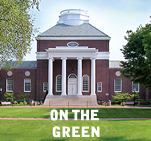
![]()

African visit opens eyes, hearts

![]()

African visit opens eyes, hearts
Six UD students and one new graduate attended the seventh World Social Forum (WSF) in January in Nairobi, Kenya, where four of them worked as volunteers at two homes for children orphaned by HIV/AIDS complications.
Six members of the group also traveled to Tanzania and climbed Mt. Kilimanjaro, the highest mountain in Africa at 19,340 feet.
The group was able to attend the WSF conference, which drew more than 50,000 delegates from about 100 nations to discuss issues of social justice and poverty, through financial support from the Department of Political Science and International Relations and Alumni Enrichment Awards from the UD Alumni Association. The Kilimanjaro part of the trip was made at the individuals’ own expense.
Kelly Livingston, EG ’07, says the WSF was an eye-opening experience. “Not coming from those kinds of situations [of extreme poverty], you take things like clothes, automobiles, electric power and water for granted,” he says. “We talk about making them cheaper, not realizing that a lot of people around the world are struggling for those same things.”
During the five-day forum, the group met Wangari Maathai, who in 2004 became the first African woman to win the Nobel Peace Prize, for “her contribution to sustainable development, democracy and peace” by promoting ecologically viable social, economic and cultural development in Kenya and the rest of Africa.
Zachary Schafer, AS ’07, says the group, which planned the entire trip on its own, decided to volunteer at the orphanages to maximize the value of the experience.
“For me, that was the most significant part of the whole trip, which surprised me because of what I thought of Kilimanjaro,” Schafer says. “It’s the feeling of knowing a child who might have HIV/AIDS and, therefore, might not live past the age of 8 or 10, missing out on the things in life that we take for granted.
“You see those kids and you realize that they deserve a future.”
Ming-Jay Shiao, EG ’06, who graduated in January and was a 2006 Truman Scholar, says working with the orphans brought statistics to life.
“We always hear about the HIV/AIDS situation, which affects up to 20 percent of some countries, and after a while you become numb to statistics, but to hold someone who is impacted every day by those statistics, who is part of the statistics, is overwhelming,” Shiao says.
Other members of the group were Scarlett Shaffer, AS ’07, Susan Lister, AS ’07, Amy Vernon-Jones, AG ’07, and Emily Helmeid, AS ’07. In addition to attending the forum and working in the orphanages, the group also was able to explore Nairobi.
“With all its social differences, Kenya is developed, very sophisticated and complex,” Lister says. “It’s really fascinating and a great place to be, even for one month. We often focus on cultural differences, and we miss the many things that make us so similar.”
After attending WSF, Shiao and five of the students took public buses to Tanzania to climb Mt. Kilimanjaro, a dream that Schafer says he had nurtured for 15 years. The seven-day camping expedition began with bad weather forcing the group to skip a two-day acclimatization hike and instead be driven up to the Shira Plateau, at an altitude of 11,000 feet.
Accompanied by guides and porters, the group camped along the route, where they joined two older British climbers, a lawyer with extensive knowledge of the geology of the mountain and an artist who shared his expertise as a hobby ornithologist. Carrying a UD banner that the students had made while they were in Kenya, the group began the final ascent at midnight and reached the summit at 8:15 a.m. on Feb. 2.
“The part at the top—holding the flag together—symbolizes what we’ll always remember about being at UD,” Schafer says.
“Everything in life is a challenge, but getting to the top and seeing that it’s possible makes you realize that it’s worth it,” Shiao says. “Dealing with social problems also is a challenge, but when you get it done it is worth the effort.”
Schafer says the group owes the unique learning experience in Kenya to the financial support from UD, particularly the Alumni Association.
“This idea, that the University should help students do new and out-of-the-box things that they otherwise would never have the chance to do is, to me, one of the noblest parts of UD’s commitment to teaching, both in and out of the classroom,” Schafer says. “I hope that more students take advantage of the opportunities available here to really push their limits and develop a proactive attitude toward their college experience.”